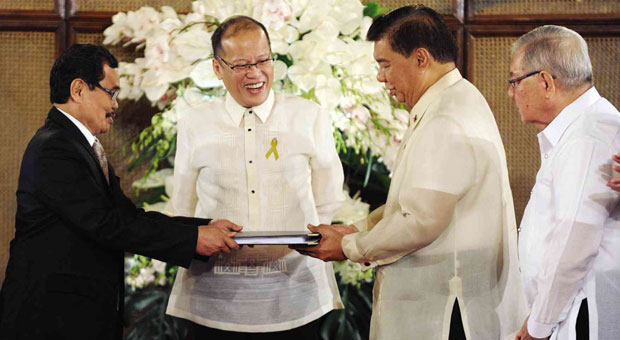Bangsamoro Basic Law to enlarge ARMM map

President Aquino smiles as Mohagher Iqbal (left), chief peace negotiator of the Moro Islamic Liberation Front, hands over the draft of the Bangsamoro Basic Law (BBL) to Senate President Franklin Drilon in Malacañang on Wednesday, Sept. 10, 2014. At right is Speaker Feliciano Belmonte Jr. The BBL will redraw the map of the Autonomous Region in Muslim Mindanao and nearby areas, as it aims to establish a larger, self-governing region. AFP
COTABATO CITY, Philippines—The proposed Bangsamoro Basic Law will redraw the map of the Autonomous Region in Muslim Mindanao (ARMM) and nearby areas, as it aims to establish a larger, self-governing region.
Miriam Coronel-Ferrer, chair of the government panel that negotiated a peace agreement with the Moro Islamic Liberation Front (MILF), said in a forum here on Tuesday that the draft Bangsamoro law would bring several areas outside the ARMM into the new Muslim autonomous region in Mindanao.
Aside from the current geographical area of the ARMM, the new Bangsamoro autonomous region would include “the municipalities of Baloi, Munai, Nunungan, Pantar, Tagoloan and Tangkal in the province of Lanao del Norte and all other barangays (villages) in the municipalities of Kabacan, Carmen, Aleosan, Pigkawayan, Pikit and Midsayap that voted for inclusion in the ARMM during the 2001 plebiscite; and the cities of Cotabato and Isabela,” Coronel said.
Distinct features
Ferrer said the draft law had several distinct features that would distinguish the proposed Bangsamoro autonomous region from the ARMM.
Article continues after this advertisement“Significantly, the proposed [basic law] provides that the Bangsamoro government shall be parliamentary in form. This would allow for a broader base of political representation and participation in governance. It would compel the formation of competitive and sustainable political parties in the region,” she said.
Article continues after this advertisementFerrer said the Bangsamoro government would also “enjoy significant powers over and above the powers granted to the ARMM today, all on the basis of the powers given to autonomous regions in our Constitution, and the creative spaces or flexibilities found therein.”
Unlike the ARMM, which is dependent on the national government, the Bangsamoro government will have fiscal autonomy through its revenue-generating powers, she said.
More responsibilities
With more powers and resources come more responsibilities, she said.
“It is an opportunity that must be made available for the common good, but also one that must not be squandered,” she added.
Spirited debates urged
Civil society groups in Mindanao called for debates on the Bangsamoro Basic Law so that Congress would hear the voices of all parties concerned.
“We must be grateful and at the same time vigilant against spoilers. May we ask the Muslim, Christian, and the indigenous people to engage in spirited discussions and debates,” Samira Gutoc of the People Development Initiative for the Comprehensive Agreement on the Bangsamoro said.
“Amid our diversity, the Filipino people should be in one alliance for the success of the Bangsamoro accord, which will benefit all through the basic law. We look forward to reading the [Bangsamoro Basic Law] and participate in its success,” said Datu Alexander Mama-o, president of the Filipino Alliance for Integrity and Reform (FAIR Movement-Philippines).